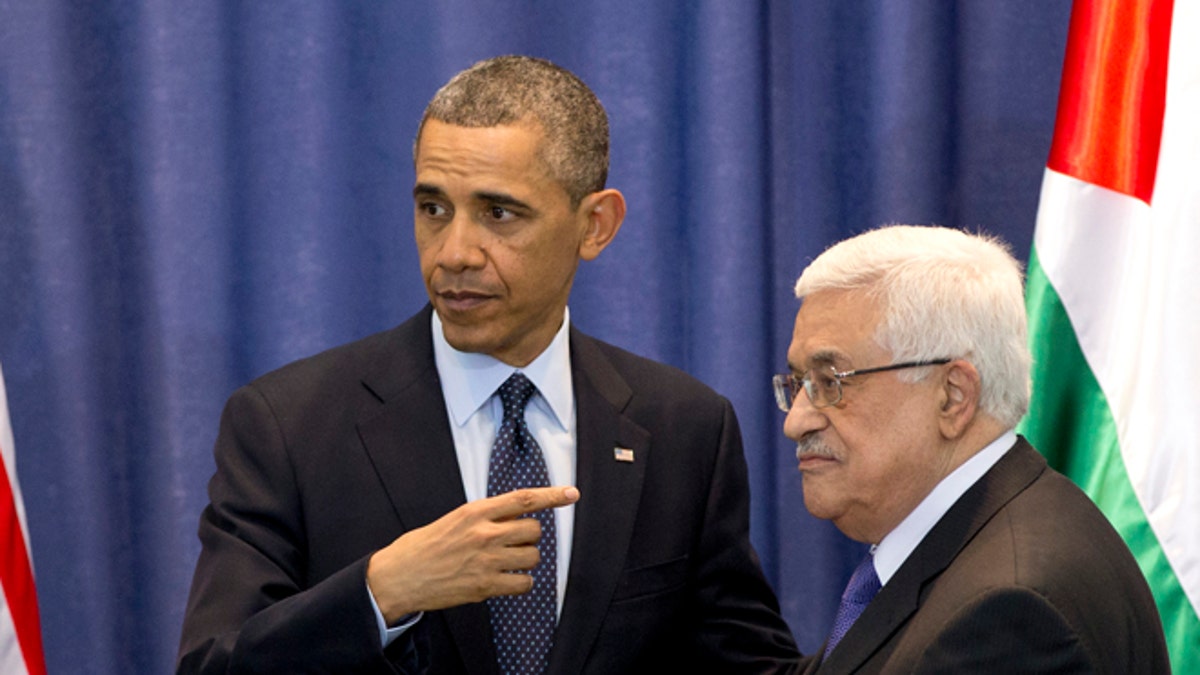
President Obama is trying to restart the mideast peace process, but Palestinian Authority leader Mahmoud Abbas can't even get along with his fellow Palestinian leaders Hamas. (AP)
HAIFA, Israel – Even as peace talks between Israel and the Palestinian Authority lurch along pessimistically, the Arab group’s two main parties are accusing each other of double crossing.
Hamas is holding a senior Fatah security officer they allegedly caught with documents exposing the Fatah-run Palestinian Authority’s collusion with the Egyptian Army. Middle East experts say the two groups have long clashed, and the fall of the Muslim Brotherhood government in Egypt may have strengthened Fatah’s hand.
[pullquote]
“Hamas are very weak since losing their Muslim Brotherhood backers in Egypt,” Anat Kurz, director of research at the Tel Aviv-based Institute for National Security Studies told FoxNews.com.
Fatah Intelligence officer Mohammed Abu Diya appears set to stand trial in Gaza on charges relating to “spreading chaos in Gaza,” after his recent arrest. Hamas leaders say he was part of a Fatah effort to foment anti-Hamas feeling in both Egypt and Gaza. They also accuse Fatah of misinforming the international media of Hamas’ role in supporting Muslim Brotherhood protests in Egypt.
The documents included the names of top Fatah officials, including members of Palestinian Authority President Mahmoud Abbas’ inner circle, according to Adnan Abu Amer, of the respected Al-Monitor website wrote.
Hamas leader Salah Bardawil presented the documents in a TV interview Tuesday on the Hamas-run Al-Aqsa TV channel. He said many of the documents relate to what he said were fabricated claims of Hamas activities in Sinai, including accusations Hamas smuggled weapons to the Muslim Brotherhood in Egypt, and holds arsenals in Gaza.
Given Hamas’ desperation over its waning power, and the region’s well-established reputation for bluff and deception, some observers have suggested the documents may have been planted. Turning the Palestinian street against Fatah could allow Hamas to round up supporters of its rival in the Gaza Strip -- the tiny piece of land that separates Israel and Egypt and is governed under strict Islamic law by Hamas, an internationally recognized terror organization.
At the very least, the affair is yet another reminder that tensions are running extremely high between the two factions, which have for years been pitted against each other as proxies for their regional patrons.
Israeli and Palestinian negotiators met in Washington last month, and were to resume talks in Israel this week with U.S. envoy Martin Indyk due in Israel Sunday. But all Palestinian factions belonging to the PLO with the exception of Fatah have refused to take part in a committee to oversee talks “due to their principled rejection of negotiations,” London-based daily A-Sharq Al-Awsat reported. And even Abbas has laid out deal-breaking conditions, including that Jews would not be permitted to live in Palestinian territories.
Paul Alster is an Israel-based journalist who blogs at www.paulalster.com and can be followed on twitter @ paul_alster
